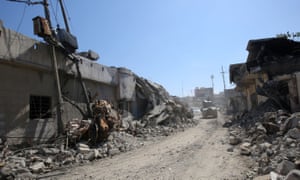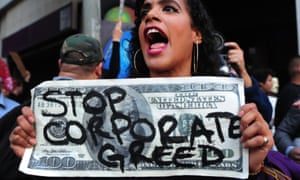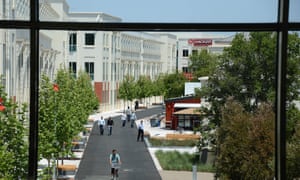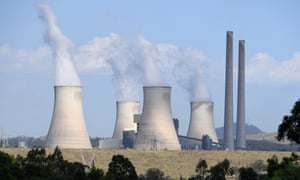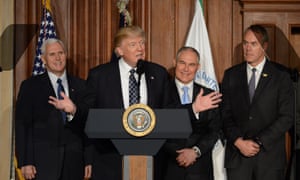President
Trump told a group of senators this week that the US military was
“doing very well” in Iraq. “The results are very, very good,” Trump
said. The families of the hundreds of innocents who have been killed in
US airstrikes since Trump became president might disagree.
Remember when presidential candidate Donald Trump blasted former president George Bush for dragging the United States into the Iraq war, calling the invasion a “big, fat mistake”? How, then, does that square with now President Donald Trump stepping up US military involvement in Iraq, as well as in Syria and Yemen, and quite literally blasting hundreds of innocent civilians in the process?
As part of the campaign to retake the Iraqi city of Mosul from the Islamic State, on 17 March, the US-led coalition launched airstrikes in a residential neighborhood that killed up to 200 people. The attacks demolished several houses filled with civilians who had been told by the Iraqi government not to flee.
These airstrikes rank among the highest civilian death tolls in a US air mission since the 2003 Iraq invasion. Responding to an international outcry at this enormous loss of innocent lives, Lt Gen Stephen Townsend, the top US commander for Iraq and Syria, declared: “If we did it, and I’d say there’s at least a fair chance that we did, it was an unintentional accident of war.”
Donald Trump loudly criticized President Obama’s air campaign against Islamic State as “too gentle” and called for a reassessment of battlefield rules designed to protect civilians. The US military insists that the rules of engagement have not changed, but Iraqi officers have been quoted in the New York Times as saying that there has been a noticeable relaxing of the coalition’s rules of engagement since President Trump took office.
President Trump has also escalated US intervention in Syria. In
March, he authorized the deployment of 400 more troops to fight the
Islamic State in Syria, and has upped the number of US airstrikes there.
According to the UK-based organization Airwars, for the first time since Russia intervened in Syria’s civil war in 2015, US strikes in Syria are now responsible for more civilian casualties than Russian strikes. Among the most devastating incidents was a strike on a school sheltering displaced people outside Raqqa that killed at least 30 people, and an attack on a mosque in western Aleppo that killed dozens of civilians while they were attending prayers.
The devastating airstrikes in Iraq and Syria are sowing panic and distrust. Residents have reported that more civilian buildings such as hospitals and schools are being attacked. The US military rationalizes that Islamic State is increasingly using these kinds of buildings for military purposes, knowing that there are restrictions on bombing them under international law.
The US defense secretary, James Mattis, insists that “there is no military force in the world that is proven more sensitive to civilian casualties” and the goal of the US military has always been zero civilian casualties. But, he added that the coalition “will not abandon our commitment to our Iraqi partners because of Isis’s inhumane tactics terrorizing civilians, using human shields, and fighting from protected sites such as schools, hospitals, religious sites and civilian neighborhoods.”
Human rights groups, however, say that US-led forces have failed to take adequate precautions to prevent civilian deaths, which is a gross violation of international humanitarian law. While Amnesty International condemns Isis for using civilians as human shields, it also insists that the US-led coalition still has an obligation not to launch attacks in which a significant number of civilians may be killed.
Trump’s deepening military involvement in the Middle East morass also extends to Yemen, with similar tragic consequences. The attack on the Yemeni affiliate of al-Qaida on 28 January resulted in the deaths of not just one Navy Seal, but dozens of Iraqi civilians, including 10 women and children.
Trump’s team has additionally upped the US involvement in Yemen’s civil war by providing more assistance to the Saudi-led campaign against the Houthis. President Obama had put a halt on the sale of precision-guided munitions to the Saudis because of the Saudi penchant for targeting civilian sites.
The US secretary of state, Rex Tillerson, is calling on President Trump to lift the ban, despite Amnesty International’s warning that new US arms could be used to devastate Yemeni civilian lives and implicate the administration in war crimes.
Potentially even more devastating is Mattis’s request that the US military participate in an attack on the Yemeni city of Hodeidah, a port that has been in the hands of the Houthi rebels. This is the port through which most of the humanitarian aid flows. With 7 million Yemenis already suffering from hunger, full disruption of the Hodeidah port could well tip the country into famine.
“The destructive cycle of intervention and chaos must finally come to an end,” roared Trump in one of his “thank you” speeches just after the election. To the cheers of the crowd, he promised that the United States would be pulling back from conflicts around the world that are not in America’s vital national interest.
It looks like that promise was one big, fat lie. Trump is dragging the United States even deeper into the Middle East quagmire, with more and more civilians paying the ultimate price.
Medea Benjamin is co-founder of the peace group CODEPINK.
Remember when presidential candidate Donald Trump blasted former president George Bush for dragging the United States into the Iraq war, calling the invasion a “big, fat mistake”? How, then, does that square with now President Donald Trump stepping up US military involvement in Iraq, as well as in Syria and Yemen, and quite literally blasting hundreds of innocent civilians in the process?
As part of the campaign to retake the Iraqi city of Mosul from the Islamic State, on 17 March, the US-led coalition launched airstrikes in a residential neighborhood that killed up to 200 people. The attacks demolished several houses filled with civilians who had been told by the Iraqi government not to flee.
These airstrikes rank among the highest civilian death tolls in a US air mission since the 2003 Iraq invasion. Responding to an international outcry at this enormous loss of innocent lives, Lt Gen Stephen Townsend, the top US commander for Iraq and Syria, declared: “If we did it, and I’d say there’s at least a fair chance that we did, it was an unintentional accident of war.”
Donald Trump loudly criticized President Obama’s air campaign against Islamic State as “too gentle” and called for a reassessment of battlefield rules designed to protect civilians. The US military insists that the rules of engagement have not changed, but Iraqi officers have been quoted in the New York Times as saying that there has been a noticeable relaxing of the coalition’s rules of engagement since President Trump took office.
According to the UK-based organization Airwars, for the first time since Russia intervened in Syria’s civil war in 2015, US strikes in Syria are now responsible for more civilian casualties than Russian strikes. Among the most devastating incidents was a strike on a school sheltering displaced people outside Raqqa that killed at least 30 people, and an attack on a mosque in western Aleppo that killed dozens of civilians while they were attending prayers.
The devastating airstrikes in Iraq and Syria are sowing panic and distrust. Residents have reported that more civilian buildings such as hospitals and schools are being attacked. The US military rationalizes that Islamic State is increasingly using these kinds of buildings for military purposes, knowing that there are restrictions on bombing them under international law.
The US defense secretary, James Mattis, insists that “there is no military force in the world that is proven more sensitive to civilian casualties” and the goal of the US military has always been zero civilian casualties. But, he added that the coalition “will not abandon our commitment to our Iraqi partners because of Isis’s inhumane tactics terrorizing civilians, using human shields, and fighting from protected sites such as schools, hospitals, religious sites and civilian neighborhoods.”
Human rights groups, however, say that US-led forces have failed to take adequate precautions to prevent civilian deaths, which is a gross violation of international humanitarian law. While Amnesty International condemns Isis for using civilians as human shields, it also insists that the US-led coalition still has an obligation not to launch attacks in which a significant number of civilians may be killed.
Trump’s deepening military involvement in the Middle East morass also extends to Yemen, with similar tragic consequences. The attack on the Yemeni affiliate of al-Qaida on 28 January resulted in the deaths of not just one Navy Seal, but dozens of Iraqi civilians, including 10 women and children.
Trump’s team has additionally upped the US involvement in Yemen’s civil war by providing more assistance to the Saudi-led campaign against the Houthis. President Obama had put a halt on the sale of precision-guided munitions to the Saudis because of the Saudi penchant for targeting civilian sites.
The US secretary of state, Rex Tillerson, is calling on President Trump to lift the ban, despite Amnesty International’s warning that new US arms could be used to devastate Yemeni civilian lives and implicate the administration in war crimes.
Potentially even more devastating is Mattis’s request that the US military participate in an attack on the Yemeni city of Hodeidah, a port that has been in the hands of the Houthi rebels. This is the port through which most of the humanitarian aid flows. With 7 million Yemenis already suffering from hunger, full disruption of the Hodeidah port could well tip the country into famine.
“The destructive cycle of intervention and chaos must finally come to an end,” roared Trump in one of his “thank you” speeches just after the election. To the cheers of the crowd, he promised that the United States would be pulling back from conflicts around the world that are not in America’s vital national interest.
It looks like that promise was one big, fat lie. Trump is dragging the United States even deeper into the Middle East quagmire, with more and more civilians paying the ultimate price.
Medea Benjamin is co-founder of the peace group CODEPINK.
